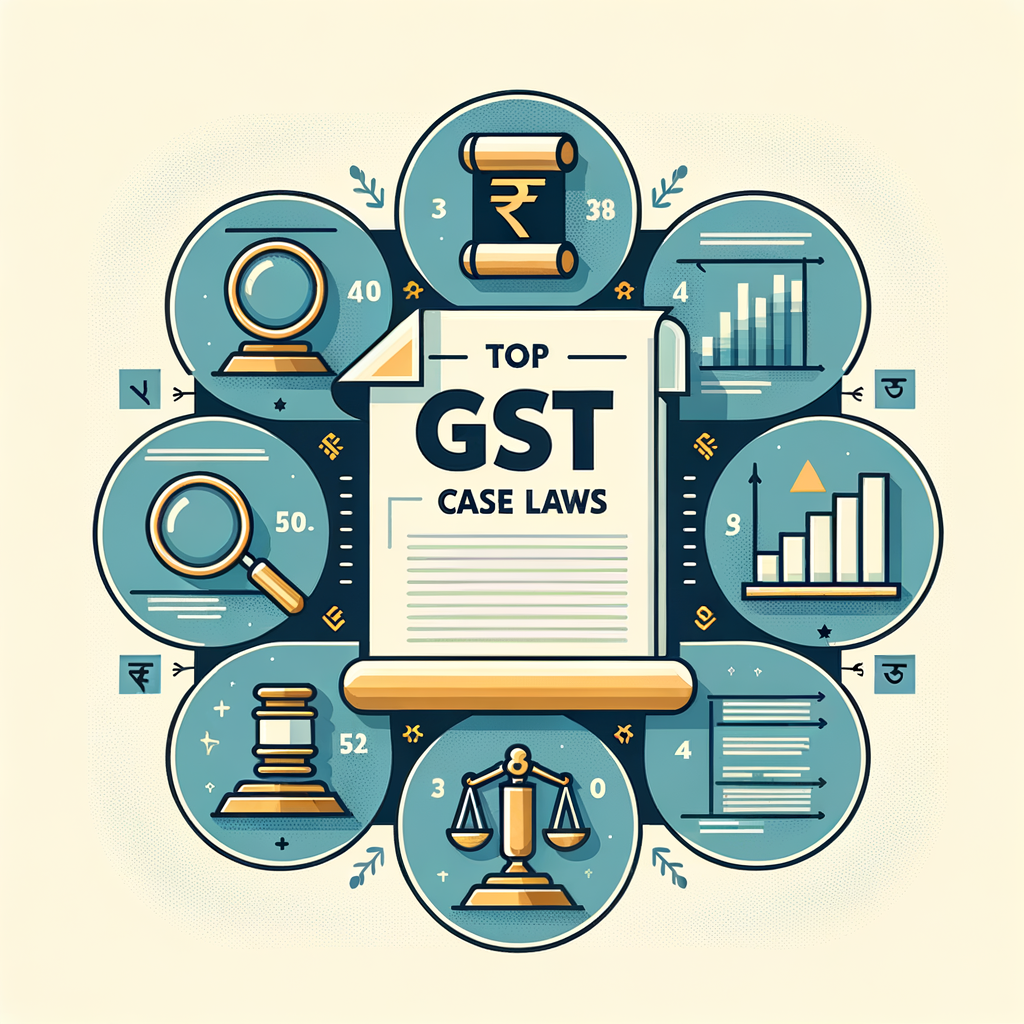Top GST Case Laws Every Indian Business Owner Should Know
Are you confident your business is 100% compliant with the latest GST interpretations? In the dynamic world of Indian commerce, a simple misunderstanding of the law could lead to costly notices and unforeseen liabilities. The GST landscape is constantly evolving, not just through government notifications, but also through groundbreaking court judgments. Staying aware of key tax case laws is no longer just for lawyers; it’s a critical component of risk management for every smart business owner. This article will break down some of the most important GST rulings India has seen recently, translating complex legal language into practical, actionable advice. By examining real tax compliance case studies India, we will help you navigate the intricate world of GST and avoid common pitfalls that could impact your bottom line.
Why You Can’t Afford to Ignore GST Tax Case Laws
Many business owners believe that as long as they file their returns on time, they are fully compliant. While timely filing is essential, and our guide on How to File GST Returns Online: A Step-by-Step Guide of the GST Filing Process & Procedure can help, the reality of compliance is much deeper. However, the Goods and Services Tax Act, like any major legislation, has areas of ambiguity. These grey areas often become the subject of legal disputes between taxpayers and the tax authorities. The resulting court judgments, or case laws, are a vital source of clarification and guidance. They are not just academic discussions; they are real-world interpretations that set the rules for how business is conducted. Ignoring these developments is like navigating a complex highway with an outdated map—you might be moving, but you risk taking a wrong turn that leads to significant financial and legal trouble. Understanding these precedents is essential for robust business planning and maintaining a flawless compliance record.
They Clarify Ambiguous GST Provisions
The GST Act is a comprehensive document, but it cannot foresee every possible business transaction or scenario. This often leads to differing interpretations on critical issues. For instance, what is the exact classification for a newly launched hybrid product? Are certain promotional expenses eligible for Input Tax Credit (ITC)? Understanding what qualifies as Blocked Credits Under Section 17(5): What ITC Cannot Be Claimed? is crucial. When questions like these arise, taxpayers and tax officers can have conflicting views. Court rulings step in to provide definitive answers. Judges analyze the letter of the law, the legislative intent behind it, and the specific facts of the case to arrive at a reasoned conclusion. This judicial interpretation brings much-needed clarity to ambiguous provisions, helping thousands of other businesses in similar situations understand their rights and obligations correctly without having to go through litigation themselves.
They Set Legal Precedents for Future Disputes
In the legal world, the concept of ‘precedent’ is paramount. In simple terms, a precedent is a legal decision that serves as an authoritative rule or pattern for future similar cases. When a High Court or, most significantly, the Supreme Court of India delivers a judgment on a GST matter, it doesn’t just resolve the issue for the two parties involved. That ruling becomes a benchmark that tax authorities across the country are expected to follow. This creates a more predictable and stable tax environment for everyone. For your business, this means you can rely on these established precedents to make informed decisions about your tax positions. If a tax officer raises a query that has already been settled by a higher court, you can cite that ruling to strengthen your case, often resolving the matter quickly and avoiding a protracted dispute.
They Reveal Common Compliance Pitfalls
Every tax dispute that reaches a court is a story of a business facing a challenge. These tax case laws serve as invaluable learning opportunities for others. By studying why a particular business was issued a notice or why a certain claim was rejected, you can identify potential weak spots in your own accounting and compliance processes. A detailed GST case law analysis for compliance officers and business owners alike reveals the common mistakes and misunderstandings that land businesses in trouble. Are you making the same assumptions about ITC eligibility? Is your documentation for a particular transaction as robust as it should be? Learning from the experiences of others is a proactive way to fortify your business against similar challenges, saving you immense time, money, and stress in the long run. A good starting point is understanding How to Avoid Common Pitfalls Leading to GST Demand Notices.
Landmark Tax Case Laws and What They Mean for Your Business
To understand the real-world impact of judicial rulings, let’s dive into a few significant tax case laws. These cases address common business challenges and provide clear guidance on how to navigate complex areas of GST compliance.
Case Study 1: Input Tax Credit (ITC) on Construction of Commercial Property
- The Case: M/s. Safari Retreats Pvt. Ltd. vs. Chief Commissioner of Central GST
- The Issue Explained: This was a landmark case concerning a fundamental aspect of Input Tax Credit. The central question was whether a business could claim ITC on goods and services (like cement, steel, and architect fees) used to construct a shopping mall, which would then be rented out to various tenants. The tax department argued that Section 17(5)(d) of the CGST Act specifically blocks ITC on goods or services used for the construction of an immovable property on one’s own account, even if it’s used for business purposes.
- The Ruling: The Orissa High Court delivered a groundbreaking judgment in favour of the taxpayer. The court reasoned that the very purpose of ITC is to avoid the cascading effect of taxes. Since the rental income from the mall was a taxable outward supply subject to GST, denying ITC on the construction costs would defeat this core principle. The court essentially ruled that if the constructed property is not for personal use but is the tool for making taxable supplies, ITC should be available.
- Actionable Takeaway for Your Business: This is one of the most important GST rulings India has seen for the real estate and infrastructure sectors. If your business involves constructing commercial properties for leasing or renting, this judgment provides a strong basis to claim ITC on your construction expenses.
- Action: It is crucial to note that the GST department has challenged this ruling. Therefore, before taking a position, you must consult with a tax expert. The team at TaxRobo GST Service can help you evaluate the applicability of this ruling to your specific projects and ensure your ITC claims are defensible.
Case Study 2: Taxability of Director’s Remuneration
- The Case: M/s. Clay Craft India Pvt. Ltd. (Authority for Advance Ruling – AAR)
- The Issue Explained: A common point of confusion for companies is how to treat payments made to directors. Is a director’s salary an ’employee’ payment, which is outside the scope of GST (as per Schedule III of the CGST Act)? Or is it a professional fee for services, making it subject to GST on a Reverse Charge Mechanism (RCM), where the company pays the GST? The tax treatment has significant compliance and cash flow implications.
- The Ruling: The Authority for Advance Ruling (AAR) provided a critical distinction. It clarified that the treatment depends on the director’s capacity.
- Executive/Whole-Time Directors: If the director is an employee of the company (with a contract of service, receiving a salary, and having TDS deducted under Section 192 of the Income Tax Act), the remuneration is treated as a salary and is not subject to GST.
- Non-Executive/Independent Directors: If the director is not an employee (working under a contract for service, receiving fees or commission), their service is considered a professional supply. The company is liable to pay GST on this remuneration under the Reverse Charge Mechanism.
- Actionable Takeaway for Your Business: This ruling makes it essential to clearly define the nature of your relationship with each director.
- Action: Review your director agreements, board resolutions, and payment structures immediately. Ensure you are correctly classifying payments and discharging your RCM liability for all non-employee directors. An incorrect classification can lead to demands for back taxes, interest, and penalties.
Case Study 3: Penalties for Minor E-Way Bill Discrepancies
- The Case: Multiple High Court Rulings (e.g., M/s. D.K. Galla vs. Union of India)
- The Issue Explained: The E-Way Bill system is crucial for tracking the movement of goods, but it can be prone to human error. A frequent problem for businesses is facing severe penalties—sometimes amounting to the entire value of the tax on the goods—for minor clerical errors. For example, a typo in the vehicle number, a mistake in the pin code, or a slight error in the goods’ description. The question before the courts was whether such minor, non-fraudulent mistakes warrant the maximum penalty.
- The Ruling: In a series of welcome reliefs for businesses, multiple High Courts have consistently ruled that the penalty should match the severity of the offense. If the accompanying documents (like the tax invoice and delivery challan) are in order and there is clearly no intention to evade tax, a minor clerical error in the E-Way Bill should not lead to the seizure of goods and the imposition of a heavy penalty. The courts have stated that a nominal penalty (often around ₹1,000) is more appropriate in such cases.
- Actionable Takeaway for Your Business: While accuracy in E-Way Bills is always the goal, these rulings provide a strong legal basis to contest disproportionately large penalties for honest mistakes.
- Action: Always ensure your transport documentation is impeccable. If your goods are ever detained for a minor E-Way Bill error, calmly present all supporting documents (invoice, transport documents, etc.) to prove the transaction’s legitimacy and the absence of any tax evasion motive. Citing these judgments can be instrumental in getting the penalty reduced significantly.
How to Stay Updated on Recent Tax Cases for Professionals and Businesses
Keeping abreast of the latest legal developments is crucial for compliance. Here are a few reliable ways to stay informed about recent tax cases for professionals and businesses without getting overwhelmed by legal jargon.
Follow Reputable Financial and Tax News Portals
Leading financial newspapers and dedicated tax-focused online portals often publish summaries and analyses of important court rulings. They break down the key aspects of the judgment and explain its impact on the industry, making it easier to digest for a non-legal audience.
Subscribe to Expert Newsletters (Like Ours!)
The best way to get curated and relevant information is through expert newsletters. At TaxRobo, our team of professionals monitors the legal landscape closely. By subscribing to our newsletter, you get timely updates on landmark tax case laws, regulatory changes, and compliance deadlines delivered directly to your inbox, saving you time and effort.
Refer to Official Government Sources
For the most accurate and official information, it’s always best to go to the source. The government portals are the definitive repository for official communications.
- Central Board of Indirect Taxes and Customs (CBIC): Check the CBIC website for circulars and instructions issued to tax officers, which often clarify the department’s stance following major court rulings. You can visit them here: CBIC Website.
- Official GST Portal: This portal hosts all notifications, circulars, and updates related to GST law and procedures. You can access it here: GST Portal.
Conclusion
Understanding the landscape of GST is about more than just knowing the tax rates and due dates. The interpretations and clarifications provided by tax case laws form a critical layer of knowledge that directly impacts your business’s financial health and legal standing. As we’ve seen from the case studies, being informed helps in making better decisions on ITC, structuring payments correctly, and effectively handling tax notices. These landmark court rulings are not academic exercises; they carry real-world financial implications. In a competitive environment, staying ignorant of these developments is a risk you simply cannot afford to take.
Navigating the complexities of GST and the ever-evolving interpretations from tax case laws can be challenging. Don’t leave your business exposed to unnecessary risks. The expert team at TaxRobo is here to provide clarity, offer strategic advice, and ensure your compliance framework is iron-clad. Contact us today for a GST health check-up!
Frequently Asked Questions (FAQs)
Q1. Do these GST rulings apply to my business anywhere in India?
A: The applicability depends on the court that issued the ruling. A judgment by the Supreme Court of India is the law of the land and is binding on all businesses and tax authorities nationwide. A ruling by a specific High Court is strictly binding only within that state’s jurisdiction. However, it holds strong ‘persuasive value’ and can be cited as a precedent in other states, though it is not mandatory for other courts or authorities to follow it. It’s always best to consult a professional on its applicability to your specific case.
Q2. As a small business owner, do I need to read the full judgment of every case law?
A: Absolutely not. Full court judgments are lengthy, technical, and filled with legal terminology. Your time is better spent running your business. Instead, you should focus on understanding the summary, the core issue decided, and the practical ‘takeaway’ from reliable sources like this blog or your tax consultant. That is the entire purpose of our analysis of these top tax case laws for professionals India.
Q3. Where can I find official information on important GST rulings in India?
A: The official GST and CBIC websites are the primary sources for the government’s response to court rulings. They often issue circulars to field formations to ensure uniform implementation of a legal principle established by a court. For the full text of the judgments themselves, you can refer to the official websites of the Supreme Court or the respective High Court that delivered the verdict.
Q4. Can a tax ruling be changed or overturned?
A: Yes, a tax ruling is not always the final word. A decision by a lower authority, like an Authority for Advance Ruling (AAR), can be challenged in a High Court. Similarly, a High Court’s decision can be appealed and potentially overturned by the Supreme Court. Furthermore, the government can also amend the GST Act itself through Parliament to nullify the effect of a court ruling if it believes the judgment goes against the legislative intent. This makes it vital to stay continuously updated.



